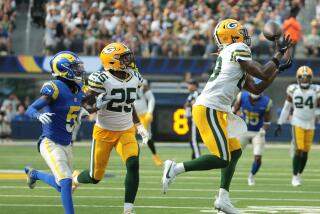Looking for That Lost Spark : Raiders: After loss to Cincinnati, Shell is hoping the veterans will take charge and provide an emotional lift Sunday against Buffalo.
- Share via
Raider Coach Art Shell is in search of some team leaders.
Reeling from last Sunday’s upset by the Bengals in Cincinnati’s frigid Riverfront Stadium and preparing to play in another icebox at Buffalo this Sunday, with the added pressure of trying to brighten their flickering playoff hopes, the Raiders could use an emotional spark.
Shell has worn out his film projector and his patience in search of consistency from the Raiders, whose play seems to change not only from game to game, but from half to half.
And he is looking for help.
“I’ve had discussions with some people on our squad about that,” he said. “Leadership has to come from the head coach, but I also know this: You must have some within the locker room.”
It’s a role Marcus Allen filled when he was in Los Angeles. Will players respond to other players? The feeling is mixed.
“We need some other guys to step up,” quarterback Jeff Hostetler said. “Coaching can only get you so far. They aren’t the ones missing assignments or dropping balls. . . . If one guy is doing all the talking or yelling or motivating, guys stop listening after a while. You get used to it, so we need everybody to be picking things up.”
But receiver Tim Brown, in his sixth season with the team, isn’t so sure there’s a leadership gap.
“I don’t think it’s as big a problem as people are making it out to be,” he said. “Sometimes you talk so much, you are not taking care of yourself. A lot of guys are good at talking, but can they back it up?”
Brown doesn’t see himself as the man to get up in a locker room and give a halftime pep talk.
“I’ve never been a false chatter kind of guy,” he said. “Some guys, when they talk, they are really sincere, but that kind of thing is not me. It would be too much out of character for me. I don’t think I could concentrate on what I have to do. Talking doesn’t win games. I’m the kind of guy who likes to lead by example. I have to bring my intensity up and go out and play playoff-type ball. If I don’t do that, I don’t feel as if I’m leading this team.”
Those sentiments are shared by cornerback Terry McDaniel, who joined the team in 1988, the same season Brown became a Raider.
“I’m not one to get into firing up players,” McDaniel said. “Each person has to fire himself up. We are professionals, and we have to treat this like a job. I don’t need a pep talk from anyone. Some guys might, but I’m not the one to do the job.”
Offensive lineman Steve Wisniewski doesn’t believe vocal support need only come from veterans.
“Everyone needs to speak up who has something to say,” he said. “That can be young players, too. It’s their team as much as anyone’s.”
A players-only meeting was held this week, but players declined to discuss specifics.
In the end, though, even Hostetler agreed that there are limits to what one player can do for another in terms of mental preparation.
“You have to start with yourself first and look outward,” he said. “Somebody can talk until they’re blue in the face, but it gets to the point where you’ve got to make up your mind to get it done yourself. You can’t rely on somebody else motivating you all the time. You can’t rely on somebody preparing you all the time.”
When Hostetler, an admitted perfectionist, sees one of his passes dropped, as was the case on a least half a dozen occasions against the Bengals, his frustration is obvious. He yanks his chin strap, clenches his fist or shakes his head, but then, the team player in him emerges and he cools his anger.
“There’s all kinds of ways to motivate people,” he said. “Some guys like to jump all over a guy for missing a ball. I’m more on the positive side. I say, ‘Hey, you’ll make the catch next time.’ I try to keep guys up. They don’t want to drop it. I don’t want to overthrow somebody or throw an interception. Guys don’t want to fumble. Guys don’t want to miss tackles.
“That’s the physical part of the game and it’s going to happen. . . . I think the big part is being mentally prepared, knowing things in and out so you don’t have to be thinking out there.”
More to Read
Go beyond the scoreboard
Get the latest on L.A.'s teams in the daily Sports Report newsletter.
You may occasionally receive promotional content from the Los Angeles Times.










